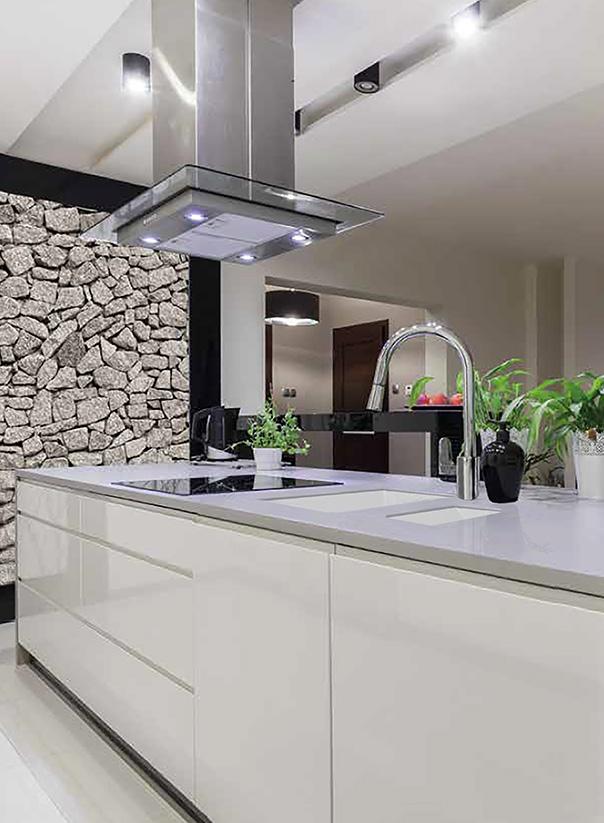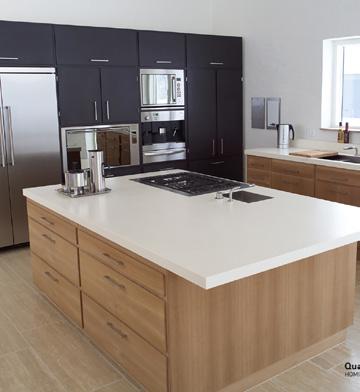
5 minute read
'On the surface' Worktop advice from Sheridan
SOLID SURFACE! SO MANY OPTIONS…
Installations Standards Partner, Sheridan gives The Installer Magazine an overview of choices of solid surface materials and how their benefits compare …
Advertisement
We all know that solid surface materials are extremely popular in the UK for use as kitchen and bathroom work-surfaces and there is plenty of choice for installers and their customers to consider when planning a project. Materials range from Corian and Hanex at the top end, with Mistral and Apollo Slab Tech mid-priced and then products like Apollo Magna and Earthstone which are priced just above the top end of High Pressure Laminate.
These materials can be supplied in finishes ranging from plain solid colours to something that’s very close in appearance to having natural marble or granite. Conveniently, their edges can be machined into almost any edge profile to suit the consumer’s aspirations.
A major advantage of these materials is that sinks and bowls can be cast, moulded or fabricated in matching materials to and set into the work-surfaces where the top surface flows into the sink as if moulded in one piece.
Once installed, they have an advantage over all other work surface materials, especially visually, by having seamless and discreet joints which means they can be installed in areas requiring high levels of hygiene in the health and catering and food retailing sectors as well as domestic kitchens. Both applications share similarities in appearance but be aware that as price levels increase so does the flexibility of what can be created and installed.
Whilst solid surfaces are not extremely hard and scratch resistant, they do benefit the end-user in as much as that most damages to their surfaces can be repaired. This, therefore, makes for an attractive proposition when comparing with other hard surfaces. Solid surface worktops are non-porous and chemically resistant. Even though the base materials are very similar being PMMA Acrylic/ Polyester based sheet materials, the main variances between them is in how the raw material sheets are fabricated into worksurfaces and installed.

1▶ At the top end of the market materials such as Corian and Hanex are manufactured in 12mm thick sheets which cut, shaped and joined together in almost infinite variations of overall length, width and thickness. They are fabricated onto a sub-frame to support the overall structure, the material can also be used as cladding to this structure or to surrounding walls and furniture, all with inconspicuous joints and the generating an appearance of being carved from a solid block.
An ability to have seamless and unobtrusive joints means that the product can be delivered in sections and then assembled and installed on site. This is critical where there are potential access difficulties like having to fit it into a lift, or if it’s a very large installation like a commercial hotel or hospital kitchen for example. These materials can easily be thermoformed and machined into curved shapes to match a designer’s imagination. These products require highly- trained and skilled fabricators and installers to deliver the almost infinite possible variety of designs and applications. 2▶ Middle market products are supplied in much thicker sheets and are not supplied on a sub frame. They are usually 20mm, 25mm or 30mm deep. The big advantage of using these is when compared to solid surface material, it is requires much simpler fabrication and installation requirements; however, the downside is that they cannot be used for some of the more complex designs or compete on thickness variations. These comparatively simple products do not require the same training and skill levels as products like Corian and Hanex but can still be joined and installed in large complex shapes (note: the sheets cannot be thermoformed but can be cut into shapes with curved edges). They are easy enough to fabricate and can also be supplied in modular sizes for KBB fitters to install in their customer’s home. 3▶ At the more affordable end of the market the raw material is manufactured into much thinner sheets ranging in thickness from 3 to 6mm, this is bonded to a chipboard core and supplied as worktops in the same way as HPL worktops. The shaping of these work surfaces is more limited but curved end pieces can be fabricated for them and moulded sinks can also be supplied. These products are usually supplied in modular sizes for home installation, the advantages of seamless and inconspicuous joints, moulded sinks, cladding, damage repair etc. are retained but at an affordable cost compared to those products more heavily priced.


Solid surface materials are batch sensitive in that each manufacturing batch of material is not quite the same as others but within each batch it is very consistent enabling large assemblies to be fabricated with minimal evidence of joints. Finished installations surfaces are non-porous, seamless and finished to a satin matt sheen that is very easy to maintain and to keep hygienically clean. The surface finish is long-lasting and can be easily renewed if desired, most surfaces damaged from impact, sharp edges and somewhat surprisingly, in most cases, harsh chemical attacks can be repaired.
There is a solid surface available for all budgets and applications, and the colour options available make it a great product for any type of kitchen. Earthstone and Apollo Magna are great options for the budget conscious or the developer, whilst Corian can be seen on the most luxurious and top-spec kitchens. Overall it is an extremely versatile product which can find a place in any kitchen design. www.sheridan-uk.com










